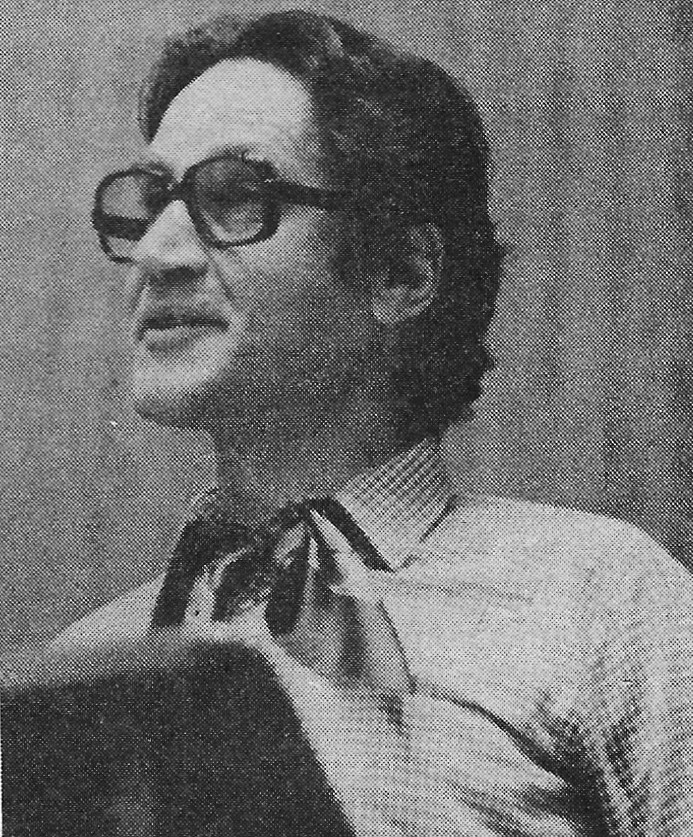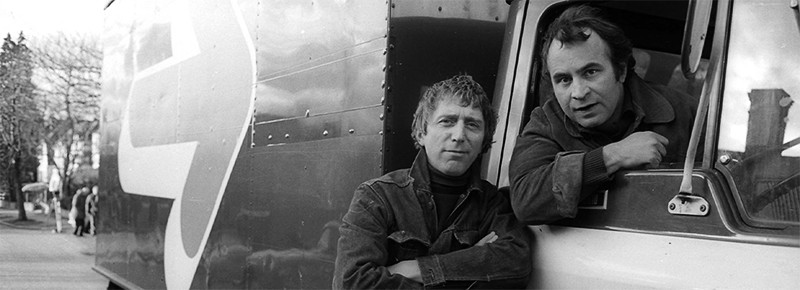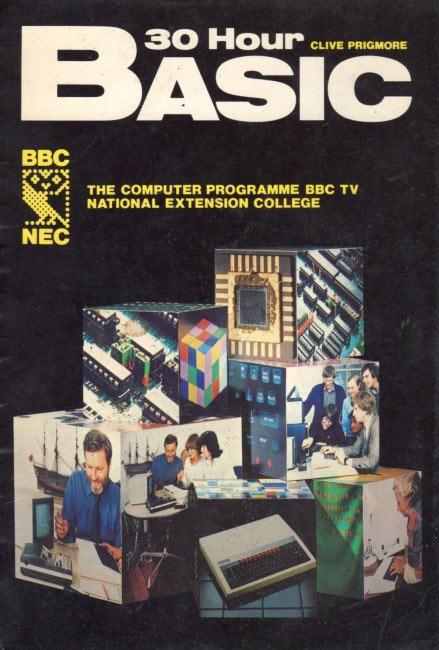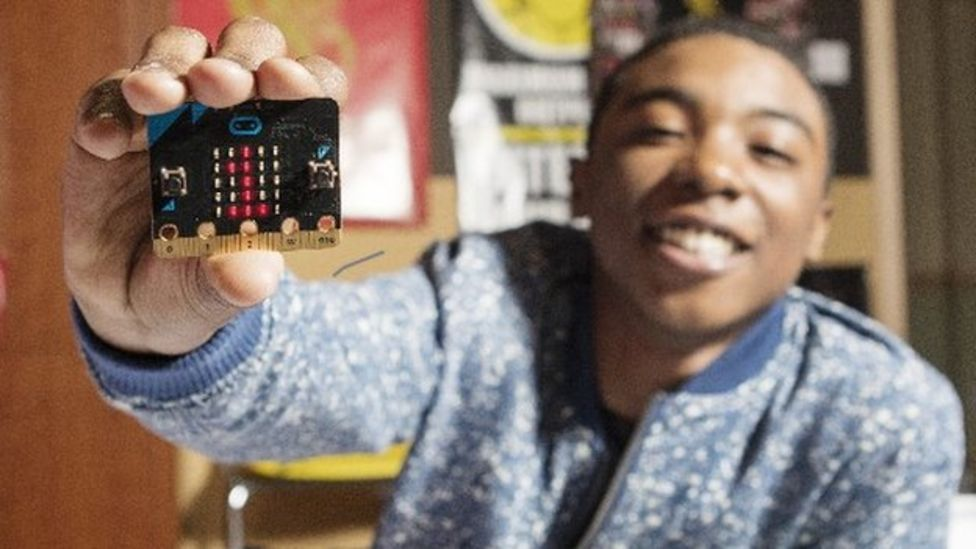
On Habré it is difficult to find a person who would not have heard of the famous Harvard course of lectures on programming Computer Science 50 , which in an accessible form teaches the listener the basics of programming and is suitable even for those who were not at all connected with IT, but decided to start studying this specialty. Several years ago it was even translated into Russian .
But this is not the first such idea; attempts to raise computer literacy have been made before. In the early 1980s, the BBC Corporation, with the support of the British government, launched an unusual distance learning course and the popularization of computer technology called the BBC Computer Literacy Project. To date, this is the most unprecedented concept of its kind in terms of scale: it has been published for almost ten years, gathering a huge audience. In those years, the UK could rightfully be called the most advanced country in the field of information technology, then it overtook even the United States.
Prerequisites
Programming is a very popular profession and has become such a long time ago. But half a century ago, this was not so obvious to the general public, other specialties were in trend, and it was still far from the IT hype and the rise of giant corporations like Google. However, programmers were needed, and it was required to interest people in this profession, to explain to them that on a computer you can not only play simple arcade games like Pong. In addition, at the time, computers were ubiquitous in factories, and people felt threatened by them, worried that their specialties would be reduced due to the computerization of production. It was necessary to calm down the public and attract new personnel.
In 1978, as part of the popular documentary television series HorizonA series of Now the Chips are Down was released , which explored the impact of computers on modern life. It was rumored that the episode was shown to the UK Cabinet and shamed by the British government that the country's population is poorly informed about new technologies, and this threatens the country's economy, against the backdrop of the beginning of the worldwide boom of personal computers; the United States had just started to release the Apple II, one of the most popular computers of the time, which blew up the market.
In the late 1970s, BBC Education conducted an international study funded by the Human Resources Commission, which resulted in a report titled Microelectronics”, Which set out the views of various experts from industry, trade unions and teachers on the current trends in the use of computers. What is noteworthy, it really does a good job of analyzing the prospects for the development of computer technology, discussing problems that are relevant today, such as: speech recognition and synthesis, the impact of technology on business, education, healthcare, and even some philosophical problems.

Christopher Evans
Around the same time, Christopher Evans wrote the futurological popular science book "The Micro Millennium", in which he describes his vision of the development of computer technology until 2000. This book will later be used as asix-episode televisionseries, The Mighty Micro , which will hit television in the fall / winter of 1979 and will greatly impress Paul Krivacek of the BBC (he would later become the producer of the Computer Literacy Project).

Paul Krivachek in 1982

Kenneth Baker Kenneth Baker was
then Britain's Secretary of Information Technology. He was very active in advocating the introduction of computers in education and production, rightly indignant that the country is far behind in the IT sector. And in 1980, he gave a speech, "National Strategy for Information Technology," in which he criticized the education system for being underdeveloped, persuaded the government to equip schools with new BBC Micro computers and declare 1982 the year of high technology, which greatly contributed to the CPL project.
Program development
All this led to the fact that in the late 70s the BBC, together with the British government, thought about the need to get people interested in programming, to show that it is not very difficult and accessible to anyone who wants to get a new specialty. They called it simple: "Computer Literacy Project", or "Computer Literacy Project".
Before the era of the Internet, it was still almost 10 years, and only scientists thought about the prospects of computer networks, therefore the course was created in the most popular format of the television series at that time. It was planned to launch ten episodes, under the general title "The Computer Program", which would be shown at a convenient time for college students and then repeated for home viewers.

On the Move
It is curious that while developing the concept of the series, the experience of eradicating illiteracy among the adult population of the country was used. Surprisingly, at the end of the 20th century, there was such a problem in Great Britain that several million adults had difficulty reading and writing. The project was launched in 75 as a television series called " On the Move". Several dozen episodes contain short sketches from the life of two couriers riding on a van, Alpha (Bob Hoskins) and Bertha (Donald Guy), in which Alf makes fun of Bert's literacy and rejoices at his success. In addition, each episode contains an interview with a person who tells how his life has changed after increasing literacy, and speeches by famous presenters of that time. At the end of each episode, a helpline was shown where one could call and get advice.
The CLP was preceded by several short series on the topic to prepare viewers for the problem and analyze the audience's reaction: The Silicon Factor and Managing the Micro... In the first series, computer technologies are demonstrated to ordinary people and their opinions are shown, and the second series was popular science, which told about the work of microprocessors and computers.
At the time, the BBC's educational television broadcasts were more didactic than they are now, and have always been accompanied by the release of books with educational and popular material. CLP is no exception. As part of the course, several manuals and collections of entertaining problems were published, both research and development, and those that could be used to solve current everyday problems in the everyday life of any person.
It is impossible to program just by reading a book on BASIC, it requires a computer. Therefore, the BBC took a chance and decided to publish not only books about programming, but also the computer itself. This was the first experience of creating mass didactic material, completely different from the usual books.

They took a responsible approach to the release of hardware for television transmission, a tender was launched to develop a computer that would be quite simple and could introduce people to a new profession without serious costs. The final price was just over £ 200 for the initial model, which was roughly the average salary for a week or two. The more powerful version was £ 325, more expensive but also comparatively budgetary. More information about the history of its creation and the specification can be found in this article on Habré: BBC Micro - the computer that beat the ZX Spectrum .

The choice of the programming language was obvious. Pascal is too heavy for untrained people, C is even more complicated, C ++ was not invented then, and languages like Fortran and Cobol are too specific and tailored for a narrow niche of tasks. That's why BASIC was chosen. Despite the meager capabilities, it has one indisputable advantage — visibility. Its syntax is so simple that the listing looks very much like a regular narrative text, and short programs are understandable even for those who are not familiar with programming at all.
In addition to manuals, the program also produced other books about computers and programming, one of them became a real bestseller; 80,000 copies were sold:

Computer software was produced on cassettes and was quite traditional for that time. Exercises for programming, programs for simple household calculations and, of course, games.

Launch of the project
The first part of the educational project was released in the years 82-83, it contained four series, each of which sequentially understands several examples of the use of computers. A total of 31 episodes were shown, 25 minutes each. Each episode discusses a small, real-world problem for viewers to solve using their BBC Micro computer and accompanying manuals. In the first series, the basics of programming in BASIC are understood, then the tasks are gradually becoming more complicated.

In addition, a 30-hour BASIC programming course was launched at National Extension College , which registered more than 150,000 people, with a dropout rate of less than 3%, which by today's standards can be considered an excellent result for distance learning programming.
The results of the first year of CLP were really impressive! The audience for each issue was from 500,000 to 2,000,000 viewers. Not surprisingly, the number of computers sold was more than two million (including sales in other countries), because without a computer it made no sense to watch the program. 85% of elementary schools and 65% of secondary schools have chosen the BBC Micro as their educational computer. The computer company Acorn also had a carrot, growing from £ 1 million in 1979 to £ 20 million in 1982.
Second stage, 1983-1989
The success was so overwhelming that the government extended the project until 1989. In the second phase, a total of more than 200 episodes were released, including the unusual format of live broadcasts "Micro-Live", programs from half an hour to two, in which there was live communication with the audience in the studio, experienced and novice programmers. During one such show, a funny curiosity happened. The show was devoted to the work of e-mail. One of the viewers, while waiting for the broadcast, overheard the manager in the next room handing out instructions to the presenters and saying aloud the password for the mailbox, which was going to be used for the demonstration. Imagine the surprise of the presenters when on the air they watched connecting to their account and sending a letter with sarcastic text (fortunately, decent) on the topic of computer security.But a very visual lesson came out for the audience.
The development of computer technology during the program's existence led to its issues discussing programming not only on BBC Micro computers, but also on others, including the ZX Spectrum, which initially competed for the program's computer, but lost the competition.
The result of the entire program was a huge surge of people's interest in computers, which pushed many people to work in the field of Information Technology. People ceased to be afraid of being deprived of their positions, businesses began to more actively introduce computers into their processes, and schools introduced training in the basics of computer specialties. It is somewhat annoying that the BBC did not think over a business strategy for expansion into foreign markets and was unable to gain sufficient popularity abroad due to strong competition with local computer distribution networks.
Heritage
You can watch the first part of the series of 10 episodes on the website of the Internet Archive .
In addition, the BBC maintains an archive of games for its computer on the Complete BBC Micro Games Archive .
BBC Micro emulators exist for almost all platforms, including mobile ones, for example: Beebdroid .
In 2015, against the backdrop of another decline in interest in IT and a shortage of specialists, the BBC tried to shake things up and released a simple single-board for the next educational program: The BBC micro: bit... This is a typical Chip-on-Board built on an ARM processor, half the size of a bank card and with rather modest hardware capabilities: an ARM Cortex-M0 processor running at 16 MHz, with 16 kilobytes of RAM and 256 kilobytes of flash memory, an accelerometer, a compass, a thermometer. and a matrix of 25 LEDs. From interfaces USB, BT and a couple of buttons. In 2020, the second revision was released on a more powerful ARM Cortex-M4 processor , supplemented by a microphone and speaker; flash memory was increased to 512 kilobytes, and RAM up to 128 kb.

Initially, it was assumed that the single-board device would be programmed on adapted versions of Pyton and JS, but later several more programming languages were released for it, from BASIC to Pascal and C ++.
***
Remembering the success of this national project, it remains only to envy the British and dream that a similar long-term course will be launched in our country, especially since computers have become incomparably more affordable, everyone has a smartphone in their pocket more powerful than BBC Micro, and the Internet for learning is much more convenient than TV with a book.
